 W
WAkka is a free and open-source toolkit and runtime simplifying the construction of concurrent and distributed applications on the JVM. Akka supports multiple programming models for concurrency, but it emphasizes actor-based concurrency, with inspiration drawn from Erlang.
 W
WAnyLogic is a multimethod simulation modeling tool developed by The AnyLogic Company. It supports agent-based, discrete event, and system dynamics simulation methodologies. AnyLogic is a cross-platform simulation software because it works on Windows, macOS and Linux.
 W
WApache Ant is a software tool for automating software build processes which originated from the Apache Tomcat project in early 2000 as a replacement for the Make build tool of Unix. It is similar to Make, but is implemented using the Java language and requires the Java platform. Unlike Make, which uses the Makefile format, Ant uses XML to describe the code build process and its dependencies.
 W
WApache JMeter is an Apache project that can be used as a load testing tool for analyzing and measuring the performance of a variety of services, with a focus on web applications.
 W
WBlueJ is an integrated development environment (IDE) for the Java programming language, developed mainly for educational purposes, but also suitable for small-scale software development. It runs with the help of JDK.
 W
WDrJava is a lightweight IDE for the Java programming language. Designed primarily for beginners and actively developed and maintained by the JavaPLT group at Rice University, its interface uses Sun Microsystems' Swing toolkit and therefore has a consistent appearance on different platforms. DrJava has the ability to interactively evaluate Java code from a console and to present output as well to the same console. It has many other features that have been designed for advanced users as well. DrJava offers a JUnit test facility.
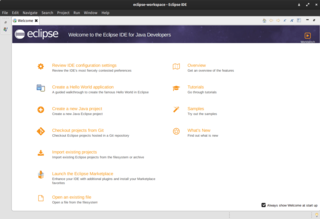 W
WEclipse is an integrated development environment (IDE) used in computer programming. It contains a base workspace and an extensible plug-in system for customizing the environment. Eclipse is written mostly in Java and its primary use is for developing Java applications, but it may also be used to develop applications in other programming languages via plug-ins, including Ada, ABAP, C, C++, C#, Clojure, COBOL, D, Erlang, Fortran, Groovy, Haskell, JavaScript, Julia, Lasso, Lua, NATURAL, Perl, PHP, Prolog, Python, R, Ruby, Rust, Scala, and Scheme. It can also be used to develop documents with LaTeX and packages for the software Mathematica. Development environments include the Eclipse Java development tools (JDT) for Java and Scala, Eclipse CDT for C/C++, and Eclipse PDT for PHP, among others.
 W
WEclipse Che is an open-source, Java-based developer workspace server and Online IDE. It includes a multi-user remote development platform. The workspace server comes with a flexible RESTful webservice. It also contains a SDK for creating plug-ins for languages, frameworks or tools. Eclipse Che is an Eclipse Cloud Development (ECD) top-level project, allowing contributions from the user community.
 W
WFindBugs is an open-source static code analyser created by Bill Pugh and David Hovemeyer which detects possible bugs in Java programs. Potential errors are classified in four ranks: (i) scariest, (ii) scary, (iii) troubling and (iv) of concern. This is a hint to the developer about their possible impact or severity. FindBugs operates on Java bytecode, rather than source code. The software is distributed as a stand-alone GUI application. There are also plug-ins available for Eclipse, NetBeans, IntelliJ IDEA, Gradle, Hudson, Maven, Bamboo and Jenkins.
 W
WGradle is a build automation tool for multi-language software development. It controls the development process in the tasks of compilation and packaging to testing, deployment, and publishing. Supported languages include Java, C/C++, JavaScript.
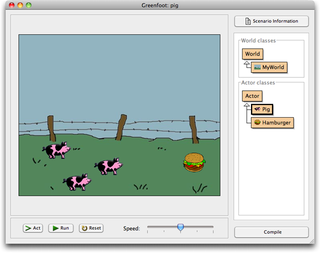 W
WGreenfoot is an integrated development environment using Java or Stride designed primarily for educational purposes at the high school and undergraduate level. It allows easy development of two-dimensional graphical applications, such as simulations and interactive games.
 W
WHudson was a continuous integration (CI) tool written in Java, which runs in a servlet container such as Apache Tomcat or the GlassFish application server. It supports SCM tools including CVS, Subversion, Git, Perforce, Clearcase and RTC, and can execute Apache Ant and Apache Maven based projects, as well as arbitrary shell scripts and Windows batch commands. The primary developer of Hudson was Kohsuke Kawaguchi, who worked for Sun Microsystems at the time. Released under the MIT License, Hudson is free software.
 W
WIntelliJ IDEA is an integrated development environment (IDE) written in Java for developing computer software. It is developed by JetBrains, and is available as an Apache 2 Licensed community edition, and in a proprietary commercial edition. Both can be used for commercial development.
 W
WJava Virtual Machine Tool Interface was introduced in J2SE 5.0 (Tiger). This interface allows a program to inspect the state and to control the execution of applications running in the Java Virtual Machine (JVM). JVMTI is designed to provide an Application Programming Interface (API) for the development of tools that need access to the state of the JVM. Examples for such tools are debuggers or profilers.
 W
WJBuilder is a discontinued integrated development environment (IDE) for the programming language Java from Embarcadero Technologies. Originally developed by Borland, JBuilder was spun off with CodeGear which was eventually purchased by Embarcadero Technologies in 2008.
 W
WJCreator is a Java IDE created by Xinox Software. Its interface is similar to that of Microsoft's Visual Studio. Because it is programmed entirely in C++,, Xinox Software has asserted that JCreator is faster than competing Java-based Java IDEs.
 W
WJDeveloper is a freeware IDE supplied by Oracle Corporation. It offers features for development in Java, XML, SQL and PL/SQL, HTML, JavaScript, BPEL and PHP. JDeveloper covers the full development lifecycle from design through coding, debugging, optimization and profiling to deploying.
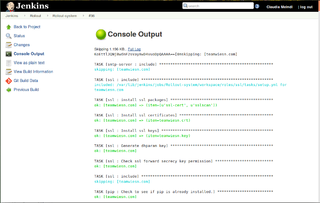 W
WJenkins is a free and open source automation server. It helps automate the parts of software development related to building, testing, and deploying, facilitating continuous integration and continuous delivery. It is a server-based system that runs in servlet containers such as Apache Tomcat. It supports version control tools, including AccuRev, CVS, Subversion, Git, Mercurial, Perforce, ClearCase and RTC, and can execute Apache Ant, Apache Maven and sbt based projects as well as arbitrary shell scripts and Windows batch commands.
 W
WKDevelop is a free and open-source integrated development environment (IDE) for Unix-like computer operating systems and Windows. It provides editing, navigation and debugging features for several programming languages, and integration with build automation and version-control systems, using a plugin-based architecture.
 W
WNetBeans is an integrated development environment (IDE) for Java. NetBeans allows applications to be developed from a set of modular software components called modules. NetBeans runs on Windows, macOS, Linux and Solaris. In addition to Java development, it has extensions for other languages like PHP, C, C++, HTML5, and JavaScript. Applications based on NetBeans, including the NetBeans IDE, can be extended by third party developers.
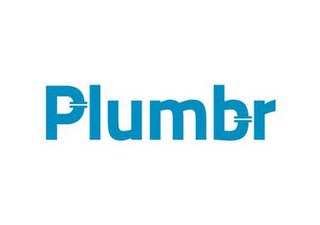 W
WPlumbr is an Estonian software product company founded in late 2011 that develops performance monitoring software running on a Java Virtual Machine (JVM). The Plumbr product is built on top of a proprietary algorithm that automatically detects the root causes of Java performance issues by interpreting application performance data.
 W
Wsbt is an open-source build tool for Scala and Java projects, similar to Apache's Maven and Ant.
 W
WSpring Roo is an open-source software tool that uses convention-over-configuration principles to provide rapid application development of Java-based enterprise software. The resulting applications use common Java technologies such as Spring Framework, Java Persistence API, Thymeleaf, Apache Maven and AspectJ. Spring Roo is a member of the Spring portfolio of projects.
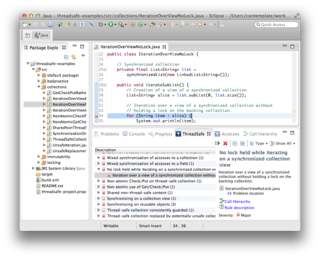 W
WThreadSafe is a source code analysis tool that identifies application risks and security vulnerabilities associated with concurrency in Java code bases, using whole-program interprocedural analysis. ThreadSafe is used to identify and avoid software failures in concurrent applications running in complex environments.
 W
WVisual Studio Code is a free source-code editor made by Microsoft for Windows, Linux and macOS. Features include support for debugging, syntax highlighting, intelligent code completion, snippets, code refactoring, and embedded Git. Users can change the theme, keyboard shortcuts, preferences, and install extensions that add additional functionality.
 W
WWaveMaker is a private aPaaS software for building and running custom apps. WaveMaker provides Rapid API App Development & Deployment to build enterprise-grade multi-device apps, and leverages Docker containerization for an app-optimized infrastructure.